1636 mission to Rome
Sir William Hamilton, a Catholic who spoke Italian, was chosen, on the death of Arthur Brett who had been intended for the mission by Sir Francis Windebank, for a diplomatic journey to the Vatican in mid-1636. With the favour of Queen Henrietta Maria, he gained the post, over a rival, William Habington. He travelled with the papal agent George Conn. [3] [4] [5]
Hamilton was nominally representing the Queen, but two of the issues on which he had been briefed were the standing of the Oath of Allegiance of James I of England, and the possibility of a Catholic bishop for England. [5] As well as religious and political matters, Charles I had given Hamilton some favours to ask of Pope Urban VIII, concerning the children of his sister Elizabeth Stuart, Queen of Bohemia. [6] In a preliminary meeting with Cardinal Barberini, Hamilton brought up four points, including also the case of John Molle, tutor to William Cecil, 16th Baron Ros and Oliver St John in Florence in 1607, where he was detained by the Inquisition for speaking against the Catholic religion, and was still held. (Molle died in 1639.) [7]
In 1638 Hamilton reported from Rome to Windebank the rumours that Godfrey Goodman, Bishop of Gloucester, had converted to Catholicism. [8]
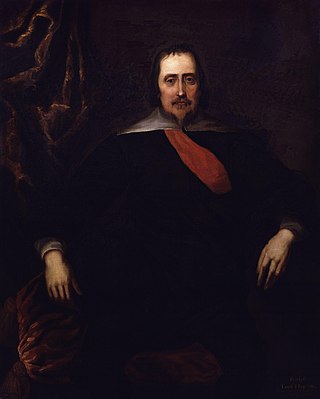
Ralph Hopton, 1st Baron Hopton was an English politician, military officer and peer. During the First English Civil War, he served as Royalist commander in the West Country, and was made Baron Hopton of Stratton in 1643.

Sir Francis Windebank was an English politician who was Secretary of State under Charles I.
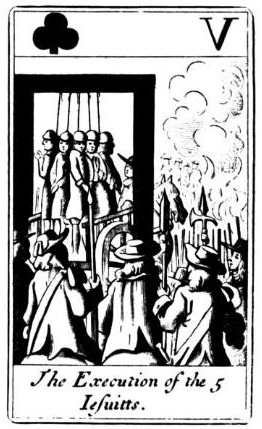
The Popish Plot was a fictitious conspiracy invented by Titus Oates that between 1678 and 1681 gripped the Kingdoms of England and Scotland in anti-Catholic hysteria. Oates alleged that there was an extensive Catholic conspiracy to assassinate Charles II, accusations that led to the executions of at least 22 men and precipitated the Exclusion Bill Crisis. During this tumultuous period, Oates weaved an intricate web of accusations, fueling public fears and paranoia. However, as time went on, the lack of substantial evidence and inconsistencies in Oates's testimony began to unravel the plot. Eventually, Oates himself was arrested and convicted for perjury, exposing the fabricated nature of the conspiracy.
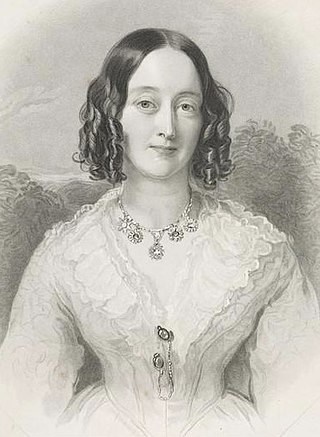
Charlotte Anne Montagu Douglas Scott, Duchess of Buccleuch and Queensberry, VA was a British peeress. A daughter of Thomas Thynne, 2nd Marquess of Bath, Charlotte married Walter Montagu Douglas Scott, 5th Duke of Buccleuch in 1829. They had seven children, including William Montagu Douglas Scott, 6th Duke of Buccleuch; Henry Douglas-Scott-Montagu, 1st Baron Montagu of Beaulieu; and the Royal Navy admiral Lord Charles Montagu Douglas Scott.

Sir Jonathan Trelawny, 3rd Baronet was Bishop of Bristol, Bishop of Exeter and Bishop of Winchester. Trelawny is best known for his role in the events leading up to the Glorious Revolution which are sometimes believed to be referenced in the Cornish anthem "The Song of the Western Men".
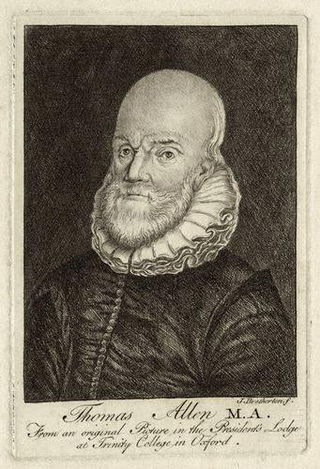
Thomas Allen (or Alleyn) (21 December 1542 – 30 September 1632) was an English mathematician and astrologer. Highly reputed in his lifetime, he published little, but was an active private teacher of mathematics. He was also well connected in the English intellectual networks of the period.

Sir Tobie Matthew, born in Salisbury, was an English member of parliament and courtier who converted to Roman Catholicism and became a priest. He was sent to Spain to promote the proposed Spanish Match between Charles, Prince of Wales, and the Spanish Infanta, Maria Anna of Spain, for which mission he was knighted. He left England after being accused of leading Catholics in 1641 and retired to Ghent.

Hengrave Hall is a Grade I listed Tudor manor house in Hengrave near Bury St. Edmunds in Suffolk, England and was the seat of the Kitson and Gage families 1525–1887. Both families were Roman Catholic recusants.

Sir Roger Townshend, 1st Baronet, was an English landowner and politician who sat in the House of Commons in two parliaments between 1621 and 1629.

Charles Morgan Robinson Morgan, 1st Baron Tredegar, known as Sir Charles Morgan Robinson Morgan, 3rd Baronet from 1846 to 1859, was a Welsh Whig peer and a member of the House of Lords.
The English College, Lisbon was a Roman Catholic seminary that existed from the 17th century to the 20th century.
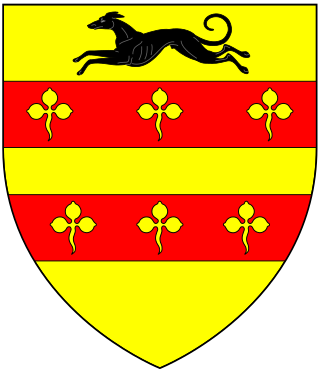
Sir Thomas Palmer, 1st Baronet (1540–1626), 'the Travailer,’ was an English knight and politician.
Sir John Temple was an Anglo-Irish lawyer, courtier and politician who sat in the Irish House of Commons at various times between 1641 and 1677 and in the House of Commons of England from 1646 to 1648. He was Master of the Rolls in Ireland.

Sir John Swinburne, 6th Baronet was an English politician and patron of the arts.

Sir John Oglander was an English politician who sat in the House of Commons from 1625 to 1629. He is now remembered as a diarist.

Nicholas Goudanus (c.1517–1565) was a Dutch Jesuit and papal diplomat.
Sir John Rivett-Carnac, 2nd Baronet was a member of the baronetage of the United Kingdom. He succeeded his father, Sir James Rivett-Carnac, 1st Baronet in 1846. He represented Lymington in the House of Commons as a Conservative from 1852 to 1860.
Arthur Phillips was an English musician and composer. He was organist of Magdalen College, Oxford, and Heather Professor of Music at the University of Oxford. He converted to Catholicism and resigned his positions in 1656 to travel to France to become organist to Queen Henrietta Maria, widow of the executed King Charles I.

Sir John Stonhouse, 3rd Baronet, PC (c.1672–1733) was an English landowner and Tory politician who sat in the English and then British House of Commons from 1701 to 1733.















